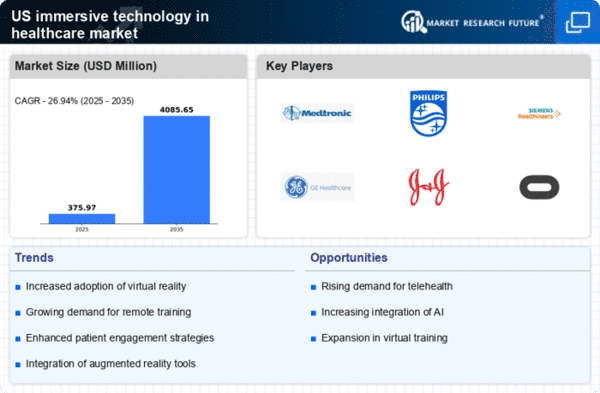Rising Demand for Telehealth Services
The growing demand for telehealth services is a significant driver for the immersive technology-in-healthcare market. As healthcare providers expand their telehealth offerings, immersive technologies can enhance remote consultations and patient interactions. For example, AR can be utilized to guide patients through self-examinations or provide real-time support during virtual visits. The telehealth market is anticipated to reach $459.8 billion by 2030, suggesting a substantial opportunity for immersive technology integration. This trend is particularly relevant in rural areas where access to healthcare is limited. By incorporating immersive technology into telehealth services, providers can improve the quality of care delivered remotely, thereby fostering market growth.
Increased Focus on Patient-Centric Care
The shift towards patient-centric care is significantly influencing the immersive technology-in-healthcare market. Healthcare providers are increasingly recognizing the importance of engaging patients in their treatment processes. Immersive technologies, such as VR and AR, offer innovative ways to educate patients about their health conditions and treatment options. This engagement can lead to improved adherence to treatment plans and better health outcomes. According to recent studies, patient engagement strategies can enhance satisfaction rates by up to 30%. As healthcare systems prioritize patient experience, the adoption of immersive technologies is expected to rise, driving growth in the market. This trend reflects a broader movement towards personalized healthcare solutions that cater to individual patient needs.
Technological Advancements in Healthcare
The rapid evolution of technology is a primary driver for the immersive technology-in-healthcare market. Innovations such as virtual reality (VR) and augmented reality (AR) are increasingly being integrated into medical training and patient care. For instance, the market for VR in healthcare is projected to reach approximately $3.8 billion by 2026, indicating a robust growth trajectory. These advancements facilitate enhanced simulations for surgical procedures, allowing healthcare professionals to practice in a risk-free environment. Furthermore, immersive technology can improve patient outcomes by providing interactive experiences that aid in understanding complex medical conditions. As healthcare providers seek to adopt cutting-edge solutions, the demand for immersive technology is likely to surge, thereby propelling the market forward.
Regulatory Support and Funding Initiatives
Regulatory support and funding initiatives are crucial drivers for the immersive technology-in-healthcare market. Government agencies and private organizations are increasingly investing in research and development of immersive technologies. For instance, the National Institutes of Health (NIH) has allocated funding for projects that explore the applications of VR and AR in medical training and rehabilitation. Such initiatives not only validate the efficacy of immersive technologies but also encourage healthcare institutions to adopt these solutions. The availability of grants and subsidies can lower the financial barriers for healthcare providers, facilitating the integration of immersive technology into their practices. This supportive environment is likely to stimulate market growth and innovation.
Growing Awareness of Mental Health Solutions
The increasing awareness of mental health issues is driving demand for immersive technology in the healthcare market. Immersive technologies, particularly VR, are being utilized to develop therapeutic solutions for conditions such as anxiety, PTSD, and phobias. These technologies provide immersive environments that can help patients confront and manage their fears in a controlled setting. The mental health market is projected to grow significantly, with estimates suggesting a value of $240 billion by 2026. As mental health becomes a priority in healthcare discussions, the integration of immersive technology is expected to expand, offering new avenues for treatment and support. This trend highlights the potential of immersive solutions to address pressing mental health challenges.
















